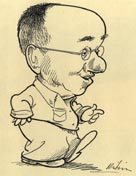by Andrew Mungo
This article was originally published in The Museletter, newsletter of the League for the Advancement of New England Storytelling (LANES), Vol. 16, No. 1, August 2003At my theater, I’ve been featuring storytellers as “short subjects” before the movie on occasion for about a year now. It’s a mostly popular program and my regular customers seem to enjoy it. Generations ago movie theaters would routinely feature short subjects, newsreels and the like to attract audiences. They stopped this practice because though popular, the shorts didn’t pay for themselves. Nobody ever bought a ticket based on the short subject. It was a cost factor without a return.
So why do I offer storytelling as an “extra” attraction? I’m of the opinion that the general public has little imagination. People do the same things, go to the same places, eat the same food over and over again. Getting people to try something new is like getting a child to eat broccoli without smothering it with cheese. In my theater, I get to expose an existing audience to storytelling, an audience that might not be exposed otherwise.
The general public doesn’t understand what a storyteller does. Or they think storytelling is only for children. Or maybe it’s a beatnik mumbling, head burrowed in a book. Solution: forced exposure. If only an unsuspecting audience could have a storyteller sprung on them, surely ignorance would abate, revelation would follow and appreciation of storytelling would flourish.
Well, it does work, sort of. As I have customers who are conversant in art films largely because they live near an art cinema and are regularly exposed to them, so now I have a few people who look forward to storytelling largely because they were exposed to it without ever having had to think about it. I often have customers ask when the next storytelling movie will play. I even have a couple, a retired doctor and his wife, who had never been to a storytelling event, who have now gone all the way to the festival in Jonesborough, Tennessee after realizing how much they enjoy storytelling.
I also have one emotional vegetable of a man who pouts and sits in the lobby until the story is over and a woman who demands that she know in advance if a storyteller will perform so she can come late. Dorks don’t really rule, however, and I long ago gave up on the notion that I can please everyone.
A more real issue is the reaction of the local arts community. In my burg, Newburyport, Massachusetts, the local arts scene is no more aware of what a storyteller does than the aforementioned clueless general public. In Newburyport there are four “open word” events, all monthly, at a gallery, a coffeehouse, a bookstore and an artist’s studio. It’s mostly poetry so the town is awash in verse. I’ve attended all these events, always telling a story when my turn at the mike comes up. Everyone is very receptive to my stories and it’s not uncommon for someone to remark on the fact that I don’t “read.” Then I get to babble about what a storyteller does.
There is a downside, though. Not everybody “gets it.” Recently a woman I know only by sight as a regular customer approached me at show time at my popcorn machine, the busiest, worst time and place to talk to a cinema person. She said that she was a poet; she had seen me “read” at a local spot. She heard that I had “readings” before the movie sometimes.
Right off my mind was full of pertinent questions such as “Will those M&Ms be plain or peanut?” and “Would you like ice with that Coke?” Everybody has the experience of standing behind a moron at a store as the dolt decides which lottery scratch ticket to buy or which brand of cigarettes is more or less lethal. Or you get behind someone at the supermarket checkout who can’t find their ATM card. You roll your eyes and wait.
Such was the case with this well-meaning poet. She thought we were having a meaningful conversation. Meanwhile I was trying to serve people and start the show. And there were people behind this woman, rolling their eyes. And waiting.
So the poet gives me her card, a lovely thing with a dreamy photo of her at her kitchen and a latte recipe on the back. Then she gets her tea and goes into the theater to grab a seat and she thinks a) she saw me “read” when she really heard me “tell,” b) that we had a real conversation about her reading before the movie when I said nothing beyond asking her if her tea was peppermint or Sleepytime, and c) that I’ll get back to her because I have her card..
If I explain that I am focusing on storytelling, will she be offended? I mean, I use everybody else’s venue, can I now restrict the use of mine? I don’t want to seem elitist or put off my friends in the larger arts community but this spot on the map is already swimming in poetry, remember. Nobody else is focusing on storytelling around here. So far I’ve successfully misplaced her card – not a brave response.
I have another regular customer who writes short stories and good ones. She has spoken of how she’s terrified of reciting her stories without a script. When I tell her that storytelling is not memorization, she gives me a blank look. So she paces the stage and reads. Even those customers who had not been previously exposed to storytelling notice the difference. I suppose it’s an educational experience.
But I want to feature storytellers, as defined by the great gods of LANES and others. And truth be told, it’s only the poet and the short story writer who have crashed the scene or attempted to. My response has been to not mention the program at local events. It’s on my web site, printed program, phone machine and lobby windows and I send out little blurbs to the local papers. But I only recruit tellers through and at proper storytelling events.
I go guerrilla. So far nobody around here has noticed, so I’m off the hook. Until I find the poet’s card. It’s around here somewhere.
All in all, I truly believe that I have reached at least the occasional member of the general public and sparked a latent interest in or appreciation of storytelling. Among the LANES members who have made the trip to Newburyport to tell before a movie: Michael Anderson, Elizabeth Appleby, Peter Ash, Deborah Ballou, Kevin Brooks, Mike Cohen, Debb Freeman, Pat Gardiner, Jackson Gillman, Meg Gillman, Larky Hodges, Robert Isenberg, Merrill Kohlhofer, Susan Lenoe, James Alexander McCoy, Peggy Melanson, Laura Packer, Lani Peterson, Joanne Piazzi and Tony Toledo. And me. I hope I didn’t miss anyone. You’re all invited. Free popcirn and more. See you at the movies.


Author’s Bio:
The Screening Room is a 99-seat storefront arts cinema in Newburyport MA, a small seaside community 38 miles north of Boston on the New Hampshire border. With a partner Andrew Mungo opened the theater in June, 1982 and has been in continuous 7-night a week operation since. He often tells stories before the films. The history of the theater can be read at www.newburyportmovies.com.
Contact Andrew Mungo at the Screening Room, 82 State St., Newburyport MA 01950 (978) 462-3456,
